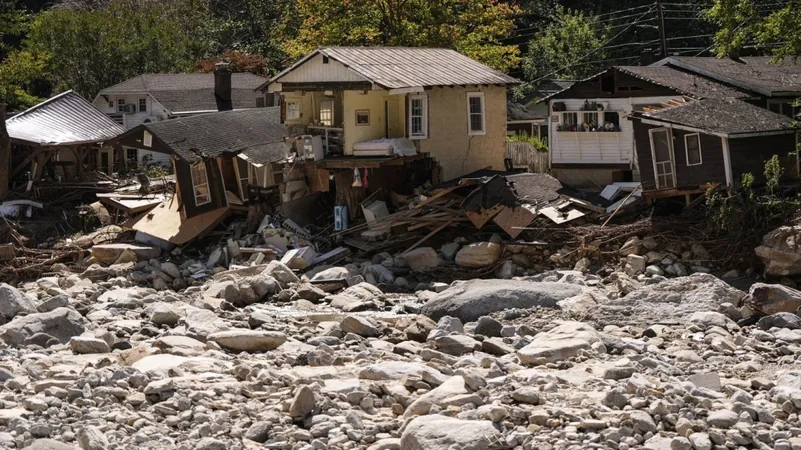
Homeowners Reeling From Hurricane Helene Face Dire Consequences Without Flood Insurance
2024-10-05
Aftermath of Hurricane Helene
In the aftermath of Hurricane Helene, homeowners across the Southeastern U.S. are confronting the daunting challenge of rebuilding their lives, often without the crucial protection of flood insurance. This devastating storm, which struck Florida’s Gulf Coast, has been responsible for over 200 fatalities, marking it as one of the deadliest hurricanes to hit the U.S. mainland since Hurricane Katrina. The National Hurricane Center has reported that Helene has unleashed trillions of gallons of rain, resulting in widespread destruction that extends hundreds of miles inward from the coast.
Severe Impacts in Western North Carolina
Western North Carolina, particularly the Asheville region, has witnessed catastrophic flooding that obliterated homes, roads, and essential services. The situation was exacerbated by the fact that these inland areas were unprepared for such an onslaught of water. In addition to North Carolina, parts of Georgia and Tennessee also experienced severe flooding, leading to significant property losses.
A Personal Story of Loss
As residents sift through the wreckage, one story stands out. Julianne Johnson, a mother from Asheville, described the harrowing moment when a massive oak tree crashed onto her property just as she was busy helping her young son. Although the tree narrowly missed their home, the damage to their roof and flooded basement was substantial. With her family already struggling to manage the consequences, they were further impeded by a lack of cell service, preventing her from filing an insurance claim until days after the storm.
Lack of Flood Insurance
Many families like Johnson's find themselves at a loss for how to finance repairs. While standard homeowners' insurance may cover certain types of damage, flood damage typically requires a separate policy. Shockingly, a vast number of homeowners are unaware that their regular home insurance does not account for flooding – an oversight that can spell financial disaster in the wake of such storms. In fact, private insurers largely do not offer flood insurance, leaving the National Flood Insurance Program (NFIP), overseen by FEMA, as the primary safety net.
Flood Insurance Statistics
According to FEMA, North Carolina has approximately 129,933 flood insurance policies, most of which are concentrated in coastal areas. In stark contrast, Florida has around 1.7 million policies statewide, underscoring the need for enhanced flood preparedness in regions that are not traditionally viewed as high-risk areas.
The Reality Check
Hurricane Helene's devastation serves not only as a warning but also as a reality check for many homeowners. Charlotte Hicks, a flood insurance expert, noted the grim truth: many survivors will not be able to completely rebuild due to a lack of flood coverage. For some, this could lead to bankruptcy or foreclosure, while entire neighborhoods may never recover.
Insurance Industry Implications
Interestingly, Helene's impacts have been somewhat mitigated for the insurance industry, as many policies are structured to cover wind damage rather than flooding. Industry experts estimate that losses could range from $5 billion to $8 billion, relatively manageable compared to the catastrophic $50 billion losses seen during Hurricane Ian in 2022.
Insurance Coverage Gap
Nevertheless, the most affected areas of Helene saw less than 1% of properties insured against flooding, a staggering statistic that emphasizes a broader national insurance gap where only about 6% of homeowners have flood insurance, predominantly in coastal regions.
Advocacy for Better Awareness
Advocacy groups are calling for greater awareness and education around flood risks. Amy Bach, the executive director of United Policyholders, emphasized the disappointment victims are likely to feel towards their insurers and FEMA. The limitations of FEMA’s assistance are evident, as the program only covers a maximum of $250,000 for homes and $100,000 for personal belongings.
Future Solutions
Moving forward, some experts advocate for a comprehensive national disaster insurance system that would provide coverage akin to what the Affordable Care Act did for health insurance. This, they believe, would offer a robust solution for the coverage gaps currently experienced by homeowners across the country.
Need for Reassessing Insurance Policies
In light of these challenges, it is critical for homeowners to reassess their insurance policies and better understand their coverage. After past hurricanes, measures were taken in North Carolina to ensure agents could adequately guide clients about flood risks, underscoring the importance of proactive risk management.
Preparing for Future Risks
As the region rallies together in recovery, the clear takeaway is that the threat of flooding is very real, and the assumption that it won't happen again could leave many in a precarious position. Acknowledging the risks and preparing for the worst is imperative in a world where climate-related disasters are becoming increasingly common.









 Brasil (PT)
Brasil (PT)
 Canada (EN)
Canada (EN)
 Chile (ES)
Chile (ES)
 España (ES)
España (ES)
 France (FR)
France (FR)
 Hong Kong (EN)
Hong Kong (EN)
 Italia (IT)
Italia (IT)
 日本 (JA)
日本 (JA)
 Magyarország (HU)
Magyarország (HU)
 Norge (NO)
Norge (NO)
 Polska (PL)
Polska (PL)
 Schweiz (DE)
Schweiz (DE)
 Singapore (EN)
Singapore (EN)
 Sverige (SV)
Sverige (SV)
 Suomi (FI)
Suomi (FI)
 Türkiye (TR)
Türkiye (TR)